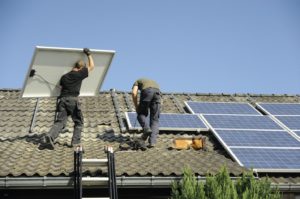Dependency on oil from foreign markets has long been a problem in the United States. Additionally, as individuals and organizations become more environmentally conscious, concerns arise about how oil and traditional electricity affect the environment. These factors leave many business owners searching for alternative energy options. Solar power may be the solution because it allows businesses to reduce their costs, increase their property value, and decrease their carbon footprint. Business owners considering investing in solar for commercial property benefit from understanding what a solar power generation process entails and the kinds of returns they can reasonably expect. An experienced business attorney from Harrison Law, PLLC can review your situation and potentially help you to evaluate a range of possible options during a confidential consultation. Contact us today at (480) 320-2310 to learn more.
What Is Solar Energy?
Solar energy is energy that comes from the sun. There are two primary mechanisms that can convert solar energy into power: solar power photovoltaics (PV) and solar thermal technology.
PV technology converts sunlight into electricity. You can then use this stored electricity the way you would use electricity derived from traditional sources such as water or coal. Solar thermal technology captures the warmth from the sun to create hot water or adjust the temperature of air.
Options for Solar Energy in Business
A number of devices have entered the market to assist in the conversion of solar energy to electric power. Many of these devices and usage scenarios have substantial potential for application in commercial settings. Some possible options for investing in solar for commercial property include:
- Solar panels: Solar panels convert light from the sun into electricity that can power electrical loads to fuel commercial electric systems.
- Heating and cooling systems: Heating and cooling systems often comprise a significant portion of utility bills, especially in a hot climate like Arizona. A good solar system can potentially replace a traditional HVAC system and may be more affordable to operate in the long run.
- Water heaters: Depending on the type of property in which solar technology is installed, solar water heaters may make a significant difference in energy efficiency and costs. Investing in this technology may make sense for businesses that rely on heavy usage of hot water, such as spas, restaurants, hotels, and residential properties.
- Outdoor lighting: Solar lights can use PV technology to obtain thermal energy, which is stored in batteries and used when it is dark.
Why Do Businesses Hesitate To Invest in Solar Energy?
The initial costs to invest in solar energy can be a barrier for many businesses. They may simply lack the funds necessary to invest in this type of technology. However, the long-term benefits typically significantly outweigh the initial start-up and maintenance costs.
Ways Solar for Commercial Property Can Save You Money
While initial costs can be a deterrent to investments of several kinds, in general most business owners tend to look favorably on short-term expenses that promise substantial long-term savings. There are several ways that solar energy can save a business money, including:
Lower Electricity Bills
One of the most significant advantages of installing solar energy systems is reducing electricity bills. A property supplied with solar panels can meet some or all of its electricity needs without relying on grid electricity. This independence can lead to much lower utility bills. Often, the energy savings alone can more than account for the costs to install solar energy systems.
Lower Maintenance Costs
Power derived from a far-flung electrical grid is subject to disruption based on other people’s use or activity, as well as disruptions caused by routine and emergency maintenance. Depending on the setting, commercial property owners may be responsible for the costs of some of that maintenance, in which case reducing the need for overall maintenance frequency will reduce costs applied to the maintenance itself, as well as costs incurred by reduced productivity during electrical grid downtimes. Solar panels can withstand many of the variables introduced by nature and are independent from grid electricity, so they are often much more affordable to maintain over their lifetime in addition to offering greater stability and reduced frequency of power disruptions.
Increased Property Value
Solar panels and other solar power technologies increase the value of property. Many people appreciate the energy-saving costs and the presence of a green alternative to traditional electricity. Therefore, this investment will likely be reflected in the value of the property in case you sell it at some point in the future.
Additionally, even though solar panels often increase the cost and value of the property, solar energy is exempt from municipal property taxes. Therefore, investing in solar power will not increase a commercial property owner’s tax liability.
Tax Credits
The tax credits offered by installing solar power can make transitioning to solar power a possibility for many businesses that might not otherwise be able to make the initial investment of capital. If businesses meet all eligibility criteria, they can deduct up to 26% of the installation cost of solar panels from their taxes.
An experienced business and tax lawyer from Harrison Law can help determine if you qualify for any of these credits:
Understanding Federal Tax Credit Options
There are two tax credits for which businesses investing in solar technology may quality: The investment tax credit (ITC) and the production tax credit (PTC). The ITC reduces federal income tax liability and applies to a certain percent of the installation costs incurred. The credit is claimed during the year the technology was installed. The PTC is a tax credit based on the electricity the system generates for the first ten years, calculated in kilowatt-hour (kWh). Property owners can generally only claim one of the credits.
According to the United States Department of Energy, the following expenses are eligible for the ITC:
- Solar PV panels
- Inverters, balance-of-system equipment, and racking
- Sales and use taxes on solar equipment
- Structures holding PV equipment if their primary use is to generate electricity and they are integrated into the design, meaning they are essential for the solar power to function
- Step-up transformers, surge arrestors, and circuit breakers
- Installation costs
- CSP equipment necessary to fulfill the objective of the solar technology
- Energy storage devices with a capacity rating of 5 kWh
- Prorated indirect costs
In addition to the tax credit, federal bonus credits may be available based on labor requirements.
Arizona Tax Credits and Businesses Operating From Home
Arizona offers a 25% tax credit on the cost of buying and installing solar panels or $1,000, whichever is less, to homeowners, according to the Arizona Department of Revenue. This could help those who operate a business out of their homes. The state also provides a tax credit of 10% of the installed cost of solar energy devices up to $25,000 of credits for one building in a tax year. A total of $50,000 can be applied per year for an individual business investing in multiple buildings.
Greener Option
While going green may not directly affect your cost savings absent the other benefits described above, it can often show consumers that you are environmentally conscious. This can increase public goodwill toward your business and enhance its reputation, leading to increased revenue over time.
Contact a Knowledgeable Lawyer for Help
While the initial costs to invest in solar for commercial property are significant, the lifetime benefits may largely outweigh them. If you are considering investing in this technology and consider consulting with an experienced business lawyer at Harrison Law, PLLC to review your options and evaluate the most cost-effective strategy for investing in solar power for your commercial property. Schedule your confidential appointment today by calling (480) 320-2310.
© 2023 Matthew W. Harrison and Harrison Law, PLLC All Rights Reserved
This website and article have been prepared by Harrison Law, PLLC for informational purposes only and does not, and is not intended to, constitute legal or financial advice. The information is not provided in the course of an attorney-client relationship and is not intended to substitute for legal advice from an attorney licensed in your jurisdiction.






